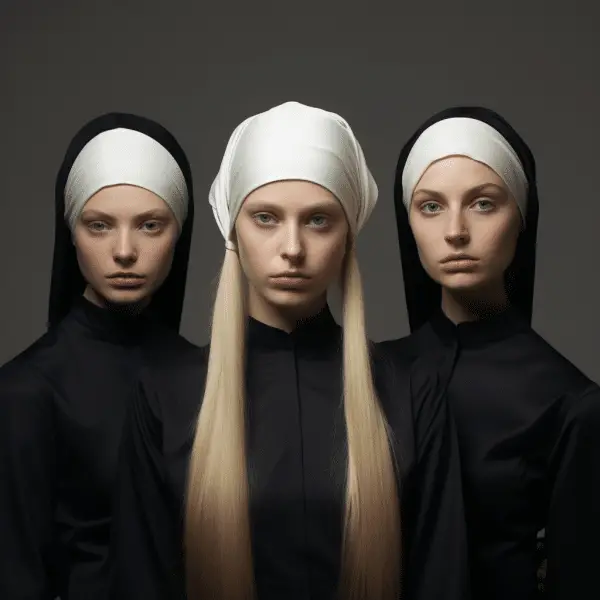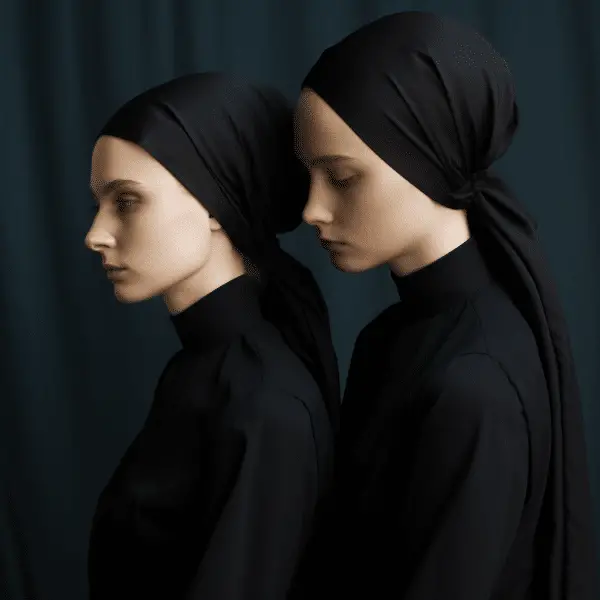

Ever wondered why nuns cover their hair? Don’t worry; we will answer this question in this article.
In many religions, women are required to cover their heads with veils or scarves. It is a requirement for everyone, especially the nuns. But why must they act in that way? Does a nun have to wear a head covering? Why should a nun spend the rest of her life hiding her hair behind a cover when there is nothing wrong with it?
We’ll explain everything and provide answers to your queries today!
Why Do Nuns Cover Their Heads with Veils?
Why do nuns cover their hair? This is likely one of the most asked questions by individuals who come across women clothed entirely in black robes with their heads constantly veiled.
The response to this question is pretty straightforward. We need to go back in time to the times when the first orders of nuns were discovered to get the answer.
Women were not allowed to leave their homes at all while with their hair exposed back then! Obviously, the brides of Christ were under a unique need to adhere to this rule scrupulously if it applied to commoners. So this was the original justification for nuns covering their heads.
There was, and still is, one more factor contributing to the widespread use of nun head coverings in all religious orders. A woman must make several vows when she wishes to become a nun, including a vow of chastity and poverty, among others.
In essence, a nun’s veil signifies her position, her adherence to the church, and her submission to God.
However, if we look at older eras, we may observe that veils and other hair coverings were frequently worn. Women of a high class once wore head coverings as a sign of status. They could distinguish themselves from the women of lower social classes in this way. So, donning a head scarf is still an indication of identification.
Does the Bible Say Anything About Head Covering?
Nuns cover their hair If we look closely at the biblical writings, we will discover that the female characters don various head coverings. It could be scarves, veils, or other items of clothing that women cover their hair with to keep it out of sight of onlookers. Holy texts state that a woman’s veil displays her modesty, dignity, and humility.
When praying or prophesying, the Bible says that a woman who does not cover her hair disgraces herself. Additionally, the Bible mentions a woman’s long hair as her glory, whereas a man’s long hair is shameful.
What Do Nuns Cover Their Heads With?
Since nuns wear veils, the answer could appear clear to everyone. But things are not that straightforward with nuns’ headgear.
The Christian custom that dates back to early Christianity includes wearing chapel veils. Even now, nuns are required to wear them inside and outside the church. A nun’s habit in the Roman Catholic church also includes wearing a veil.
Later, the Catholic church also adopted this custom. These days, veils are even worn by some Catholic women who are not nuns.
Nuns wear other things as well, though! As you may have observed, nuns can wear hats. These hats are known as Kamilavkas. They are cylindrical and are supposed to be covered with a veil. These hats are typical in Eastern Orthodoxy, where monks and nuns wear them.
What Types Of Religious Headwear Are There?
Though veils are the commonest religious headwear, there are numerous other types. The table below summarizes the various types of religious headwear available.
| Religion | Headwear |
| Eastern orthodox/Catholicism | Miters, kamilavkas, veils |
| Judaism | Yarmulke, scarves, sheitel |
| Islam | Burqa, hijab, niqab, |
| Amish | Straw hat for men, organdy head bonnet for ladies |
| Sikh | Dastar |
Do Catholic Nuns Shave their Hair?
Many people question whether catholic nuns shave their hair.
Well, to be completely honest, not all nuns need to have short hair! It is not a requirement at all in the majority of orders.
But in the early days of Christianity, a woman who wanted to give her life to God and become Christ’s bride would have to shave her head. This was a sign of her commitment to the church and her beliefs and a signal that she would devote herself to serving God henceforth. It might also be seen as an act of giving up vanity.
Today’s Catholic nuns and sisters typically just cut their hair short to signify their spiritual development.
However, we believe there is another (wholly practical) reason for doing that. When your hair is short, wearing a veil is much simpler!
Why Do Nuns Dress in Black Robes?
As you may have already noticed, nuns don’t have a lot of options for the color of their gowns. They are only permitted to wear black, so naturally, the issue of why arises.
The symbolism of the nun’s habit worn in monasteries holds the key to the answer. Black has long been thought to stand for dignity, simplicity, and repentance. For a woman who has offered herself to Christ, this is the ideal symbol of her choice.
Some nuns may still dress in white, though. For example, during their second year of the nunnery, a novice nun of the Cistercian order is permitted to dress in a white robe and headcover.
As you can already tell, the nuns’ garments and headcovers were never chosen randomly. Like everything else related to the church and religion, the color of nuns’ robes has significant symbolic meaning. Similar to the custom of cutting hair before entering a nunnery.
Final Take
We hope this article has answered your question; why do nuns cover their hair? The answer to the query is simple.
When the orders of nuns were discovered, women were not allowed to leave their homes with their hair exposed. Obviously, nuns had to follow this rule, too, since they were supposed to be an excellent example to the community. So this was the original justification for nuns covering their heads.
Another factor contributing to the widespread use of nun head coverings in all religious orders is that a woman must make several vows when she wishes to become a nun, including a vow of chastity and poverty, among others.
In essence, a nun’s veil signifies her position, her adherence to the church, and her submission to God.







